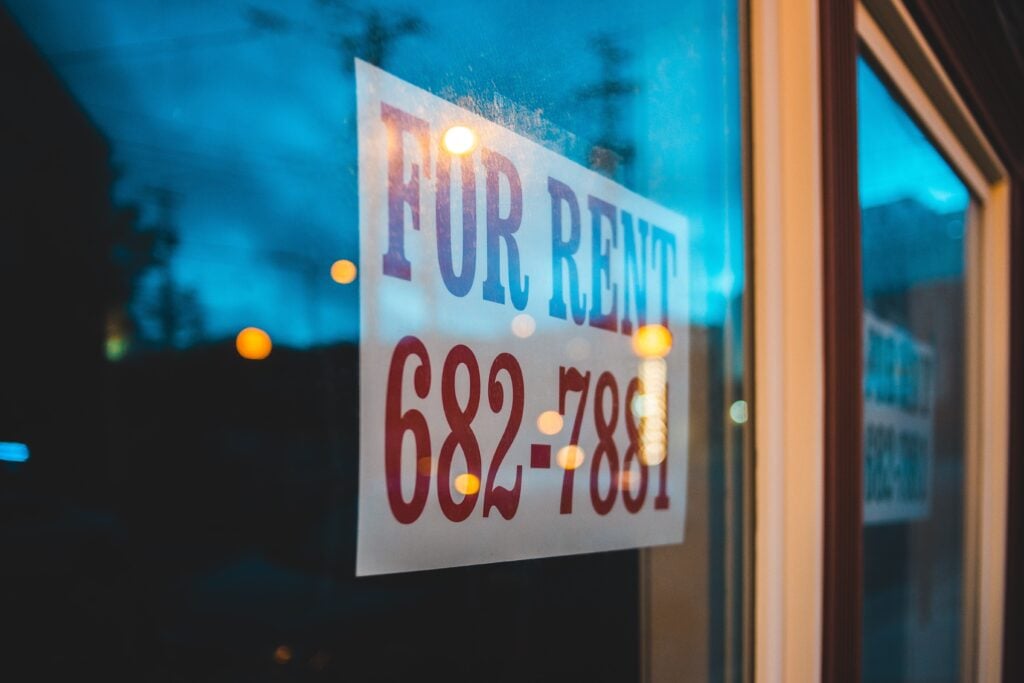The real estate market barreled through 2021 with a ferocity that impacted all segments of the market.
As home prices shot up, rent growth followed, while short-term rental demand skyrocketed in the wake of Americans getting vaccinated and returning to travel. Institutions also started homing in on single-family homes and NFT leases became a thing.
And after years of anticipation, yes, WeWork finally went public.
Meanwhile, proptech in the real estate investment world had a big year too. Numerous companies saw millions in funding from venture capitalists, as startups like Lessen and Place sought to bring fresh solutions to what many view as an outdated industry.
Without further ado, here’s all the hot real estate investment news that hit the press in 2021.
Proptech’s banner year
Getty Images
“The residential space is going to see more venture capital infusion than any category,” Fifth Wall Ventures co-founder Brad Greiwe told attendees at Inman Connect Las Vegas 2021. “The reason being is consumers in residential are most interested in engaging in technology and doing so in new and interesting ways.”
“We’ve seen successes and failures in this space,” Greiwe later added. “Residential brokerage tech is probably the biggest graveyard in venture capital, let alone proptech — but it doesn’t mean the capital [will] stop flowing.”
Greiwe’s words come in light of a year in which proptech companies reaped hundreds of millions of dollars in funding. Just six months after reeling in $35 million in its Series A round, rental tech company Lessen brought in $170 million in its Series B in December (led by Fifth Wall Ventures), tipping the company’s valuation into “unicorn” territory, or a valuation of over $1 billion. Place, a real estate tech and agent services company, also made it to unicorn status in November, securing $100 million in a Series A round led by a division of Goldman Sachs Asset Management.
A number of other companies in the rental management and investment space also gained attention in the last year from venture capitalists — short-term rental management platform Guesty netted $50 million in its Series D, bringing its total funding to over $110 million. Meanwhile, rental homeownership startup Doorvest brought in a $39 million funding round in November and tenant screening and lease app startup RentSpree raised $8 million in new funding in July.
On the luxury vacation home side, international co-ownership luxury startup Kocomo netted $56 million in debt and equity financing the during September. And despite ongoing backlash from very vocal, anti-Pacaso communities in Northern California, the co-ownership luxury home company scored $125 million in a funding round from Softbank Vision Fund 2 that same month, showing that investors aren’t too stressed about a few protestors.
WeWork and Vacasa go public

Vacasa / Twitter
The long-embattled co-working startup WeWork finally went public in October following a merger with special purpose acquisition company (SPAC) BowX and after a two-year delay of plans.
The accomplishment came after the company’s initial attempt at an IPO in 2019 when company documents revealed significant losses and unearthed criticism about the company’s culture under then-CEO Adam Neumann, who shortly thereafter, stepped down. Following its long-awaited debut, WeWork saw a small spike in stock prices, however, achieving a market cap of about $9.3 billion.
Vacation rental management company Vacasa closed out 2021 with a bang by making its own public debut on the New York Stock Exchange. Leading up to its IPO, Vacasa too completed a merger with a SPAC, TPG Pace Solutions, resulting in a company valuation of $4.4 billion.
CEO Matt Roberts said the company would use proceeds from the transaction to accelerate its long-term business plan, which includes enhancing tech, adding more homes to its platform and generally improving the vacation rental experience for consumers.
Several months prior to its public debut, Vacasa also acquired a major rival in the vacation rental space, Turnkey Vacation Rentals, adding about 6,000 units to the company’s portfolio at that time. The move helped solidify Vacasa as a leader in the space, and Roberts said at the time that it was “a significant milestone” that would help the combined companies “create a premium standard for vacation rentals.”
Supreme Court puts an end to the federal eviction moratorium

Peter Dazeley / Getty Images
At the beginning of 2021, the federal eviction moratorium enacted by the Centers for Disease Control and Prevention (CDC) went through a number of periods of expiring or approaching expiration and then being extended or reinstated. Renters and landlords alike were left in limbo for several months as lawmakers, the Biden administration and the CDC continually reassessed whether or not an eviction moratorium was necessary or if it was even constitutional.
But by the end of August, the U.S. Supreme Court blocked the Biden administration’s final moratorium, just weeks after it was enacted. The ruling argued that the moratorium as enacted by the Biden administration ultimately gave the CDC “a breathtaking amount of authority” and that if a moratorium were to continue, it would need to be enacted by lawmakers directly.
Despite funds being made available to landlords and renters through the Emergency Rental Assistance program, many individuals from both groups found funds extremely challenging to access. Strict regulations about how funds could be used, the paperwork required to obtain them, and long delays in distribution saw landlords deciding to decline the funds altogether.
Public education about available rental assistance also proved to be a challenge, as many renters reported not knowing about the Emergency Rental Assistance program and landlords were not required to notify tenants about it. While moratoriums were ongoing, renters also faced the challenge of potentially facing judges in an eviction hearing who interpreted the ban much less stringently and sometimes allowed evictions to continue.
The rental market’s rebound

Erik Mclean / Unsplash
As prices in the for-sale market kept climbing over the course of 2021 — breaking records right and left — more and more would-be homebuyers had to bow out of the market and turn to rentals.
After a truly rocky 2020 in which many people opted to leave city rentals to either move in with family elsewhere or buy their own home in which to shelter-in-place, the return of a robust rental market in 2021 was a welcome sight for landlords and property managers.
But that influx of population into the rental market ultimately caused rent prices to spike too. Rent price growth broke 16-year records in both June and July, according to CoreLogic. By October, rents in even some of the priciest, most densely populated cities that were hardest hit by the pandemic started to grow again.
The sector’s strong rebound wasn’t great for everyone, however. Unprecedented competition in the rental market not only led to surging rent prices, it also spurred rental bidding wars in some markets. From Florida to California, agents reported renters offering to increase their monthly rent by as much as hundreds of dollars above list price or even pay a full year of rent in advance to beat out the competition.
“I’ve never seen anything like this before,” Adam Docktor, a Realtor with Compass in Fort Lauderdale, told Inman.
Institutional investors make a comeback

Paul Hanaoka / Unsplash
As national rents started regaining momentum, institutional investors seemed to read the writing on the wall and began reentering the market in droves.
Starting in the first quarter of 2021, investors already began gearing up their home purchases, buying about 59,000 homes, according to data from Redfin. By the second quarter, that number increased to about 68,000 homes, and by the third quarter, investor purchases added up to about 90,200 homes. That figure represented roughly 18 percent of all U.S. home purchases during the quarter, equal to $63.6 billion in homes, a new record.
Blackstone Group was one big name making moves in the rental market over the course of 2021. The global investment company partnered with TruAmerica Multifamily to purchase roughly 5,800 apartment units in San Diego, California, in May and had plans to invest more than $100 million renovating the properties.
The investment giant then acquired single-family rental home company Home Partners of America Inc. for $6 billion in cash in June, effectively reestablishing itself in the single-family rental market. Previously, Blackstone had sold off its shares in Invitation Homes in 2019, only to re-enter the single-family rental market in 2020 when it spent $240 million on a preferred equity stake in Tricon Residential Inc., a Toronto-based company that purchases single-family rental homes in North America.
Traditionally commercial real estate companies sought to get in on the residential rental market’s action this year as well. Commercial property giant Jones Lang LaSalle, Inc. (JLL) teamed up with rental property management company and investment platform Roofstock in March to enter the single-family rental space.
Through the agreement, Roofstock purchased a real estate asset-management platform targeted toward small investors called “Stessa” from JLL while JLL contributed an undisclosed amount of cash for a minority stake in Roofstock. Roofstock also agreed to help JLL clients worldwide that are interested in owning multiple rental homes.
“The single-family rental asset class is seeing strong demand from our investor clients — both private and increasingly institutional — and this investment will position our teams to offer unique insights and access to opportunities in this space,” Richard Bloxam, CEO of Capital Markets of JLL, said in a statement at the time.
The explosion of the short-term rental market

Airbnb
Americans enjoyed the privilege of getting vaccinated during the spring of 2021, and as a result, were ready for a “hot vax summer” of returning to travel.
Data from Airbnb showed vacation travelers largely booking short-term rentals within driving distance from home in more rural areas. But cities also saw a surge in longer vacation rental stays. In short, America was ready to go on vacation again, and short-term rentals became their preferred stay option.
The sudden resurgence in travel and short-term rental demand even yielded a shortage of available short-term rentals. By April, U.S. short-term rental demand exceeded 2019 levels and the market was already on track to see its busiest summer ever.
The combined factors of remote work capabilities, increasing vaccination rates, the loosening of travel restrictions and hosts taking their listings off of short-term rental platforms to use vacation homes themselves all contributed to a summer in which short-term rentals were hard to find.
But that explosion in demand allowed short-term and vacation rental companies to reap the benefits. Both Airbnb and Vacasa earned all-time highs in revenue during the third quarter of 2021. Likewise, Vrbo’s performance helped Expedia Group to surpass its third-quarter earnings expectations.
“The world is undergoing a revolution in how we live and work,” a third-quarter Airbnb shareholder letter stated. “Technologies like Zoom make it possible to work from home. Airbnb makes it possible to work from any home. This newfound flexibility is bringing about a revolution in how we travel.”
Investors dive into the digital world

Mars House by Krista Kim
Following the art world’s lead, real estate investors in 2021 took the leap into the world of cryptocurrency, non-fungible tokens (NFTs) and the metaverse.
Investor real estate purchases with cryptocurrencies like Bitcoin and Dogecoin started gaining more traction in the market over the course of 2021. Pacaso even announced it would begin accepting cryptocurrencies as a method of payment for ownership in its second homes.
Mars House, the first-ever NFT house, also went up for auction in March, ultimately selling for about half a million dollars. Meanwhile, 20Mission, a San Francisco-based startup co-living space, auctioned off 75-year NFT leases, a move that followed the building’s status as, reportedly, the first building to ever accept Bitcoin as rent.
As news was still fresh about Facebook changing its name to “Meta” in advance of the mainstreaming of the metaverse (a place where virtual, augmented and physical reality meet), yet another outstanding digital real estate transaction took place. A virtual plot of land, spanning roughly 6,000 square feet, located in the online world of Decentraland, sold for $2.4 million. The land was sold as an NFT and purchased with an Ethereum-based cryptocurrency called MANA.
Though there’s been a recent wave of digital transactions and digital currencies in real estate, it may not necessarily mean radical change for the industry yet, Inman’s Jim Dalrymple II explained in a post from March.
“Ultimately, NFTs, the blockchain and upstarts like Zillow, may yet build a world that is radically different from the one we have now,” Dalrymple wrote. “But if the past is prologue, that world won’t emerge overnight.”



 Are You Interested in West Eleventh Residences Miami?
Are You Interested in West Eleventh Residences Miami? Are You Interested in ONE Park Tower by Turnberry?
Are You Interested in ONE Park Tower by Turnberry? Are You Interested in Diesel Wynwood Condominium?
Are You Interested in Diesel Wynwood Condominium? Are You Interested in Five Park Miami Beach?
Are You Interested in Five Park Miami Beach? Are You Interested in Cipriani Residences Miami?
Are You Interested in Cipriani Residences Miami? Are You Interested in Bentley Residences Miami?
Are You Interested in Bentley Residences Miami? Are You Interested in Baccarat Residences Brickell?
Are You Interested in Baccarat Residences Brickell? Are You Interested in Aria Reserve Miami?
Are You Interested in Aria Reserve Miami? Are You Interested in 888 Brickell Dolce & Gabbana | Miami?
Are You Interested in 888 Brickell Dolce & Gabbana | Miami? Are You Interested in 600 Miami WorldCenter?
Are You Interested in 600 Miami WorldCenter? Are You Interested in HUB MIAMI RESIDENCES?
Are You Interested in HUB MIAMI RESIDENCES? Are You Interested in WALDORF ASTORIA RESIDENCES?
Are You Interested in WALDORF ASTORIA RESIDENCES?